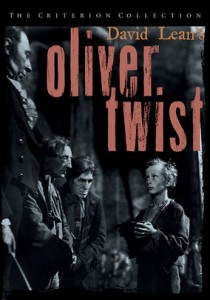Oliver Twist-1948
Director David Lean
Starring Alec Guinness
Scott’s Review #279
Reviewed October 3, 2015
Grade: A-
Oliver Twist, the 1948 film version, is vastly different from the 1968 version, which turned the classic Charles Dickens novel into a musical, albeit a dark one, with colorful sets and brilliant art direction.
This version, made in black and white, is a better telling of the novel and contains masterful direction and cinematography.
Given the enormous length of the novel, some characters and details are inevitably trimmed or modified to fit a one-hour and forty-eight-minute film.
The film is a gorgeous cinematic treat with glowing lighting and creative camera angles, thanks to the wonderful direction of legend David Lean (Lawrence of Arabia).
The film begins on a stormy night with the birth of poor little Oliver, his mother was frightened and dies in childbirth, leaving him to live a life of hardship in a workhouse. His mother possesses a beautiful locket, stolen by an old crone, who assists in the birth.
Now a young boy, Oliver draws the shortest straw, forcing him to utter the famous line “Please Sir, I want some more”, about desiring more bland gruel that the orphans are forced to eat.
From this point, Oliver is deemed troublesome and sold to an undertaker named Mr. Sowerberry. When this doesn’t work out, Oliver takes to the harsh streets of London to make his fortune among thieves such as Fagin, Bill Sykes, and The Artful Dodger, who become his friends, but also his enemies.
Since I have seen the musical version of Oliver so many times over, and have also read the novel, it is difficult to watch this film without comparing it to the others.
Oliver Twist is a more dark, gritty experience than Oliver! and specifically and closely resembles the novel, with details surfacing such as the back story of the locket that takes on a more central role when the old crone repents on her deathbed, revealing all to the equally crooked Mrs. Corney.
Another example is the casting of less polished, or average-looking actors than Oliver! had. Fagin, for example, played by Alec Guinness, is heavily disguised, with stringy hair and a prosthetic nose, a close comparison to the illustration drawing of Fagin in the novel.
Bill and Nancy have smaller, though crucial, roles to play, but are not as fleshed out as the other versions. The timing of particular events comes into play- Nancy does not meet Oliver until later in the story.
The film does have light-hearted moments, which balance the heavy drama perfectly. The comic shenanigans of beadle Mr. Bumble and matron Mrs. Corney, both sinister characters, but together a bickering, boorish couple who eventually marry each other, add humorous moments to the story as she becomes a domineering wife throughout their many fights and schemes.
The fact that the group of young thieves (boys) all live with Fagin in close quarters, the suggestion of child molestation is certainly implied, but not pursued quite as much as in the novel.
I do not think that filmmakers in 1948 would have dared to go there in a film that was arguably meant to have a wholesome feel.
The certainty that Nancy is a prostitute and primarily sleeps in the streets is also addressed, though she is still rather glamorous and clean-looking. The class distinction is evident.
The bleakness of the workhouse and Fagin’s quarters counterbalances the rich and lush home of Oliver’s savior, Mr. Brownlow. I love his estate and housekeeper, the kindly and sweet Mrs.Bedwin.
A close retelling of the novel, Oliver Twist is a wonderful film that can be enjoyed by parents and children alike and can be appreciated through generations of families.
